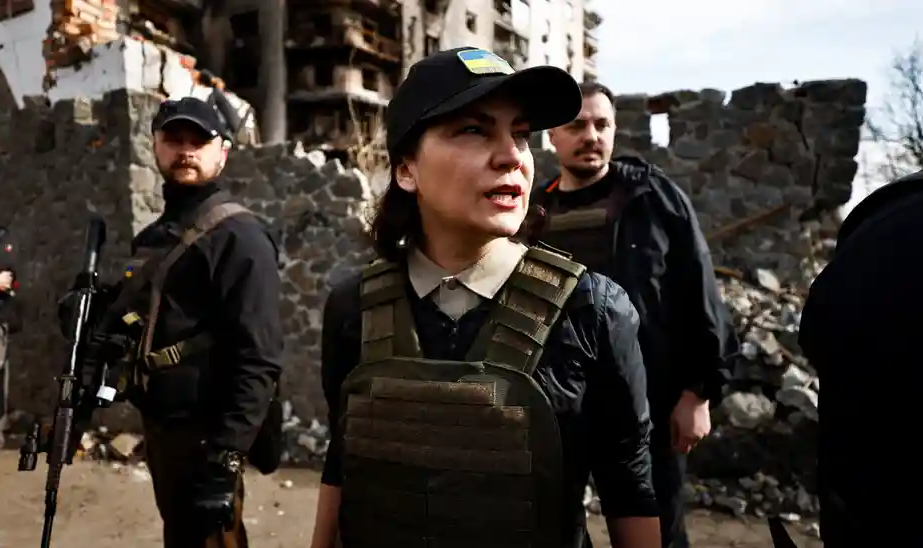New Post
Russia-Ukraine war: what we know on day 44 of the invasion
Russia-Ukraine war: what we know on day 44 of the invasion
The Kremlin admits suffering ‘significant losses’, Russia is kicked off the UN human rights council and Zelenskiy calls for ‘bolder’ sanctions
The Kremlin has admitted suffering “significant losses” of troops since Russia launched its invasion of Ukraine, in a rare admission of how badly the war has gone. The Kremlin spokesperson, Dmitry Peskov, said he hoped the besieged city of Mariupol would be “liberated from nationalistic battalions” sooner rather than later.
Ukraine’s president Volodymyr Zelenskiy has highlighted the bravery of his nation in his latest late-night national address. “Being brave is our brand,” he said, while calling for bolder sanctions on Russia. He also claimed Russian troops were preparing “elaborate propaganda scenarios” to make it look like civilians they had killed in Mariupol were killed by Ukrainian soldiers.
A Russian airstrike on a railway near Barvinkove station in Donetsk Oblast has blocked three evacuation trains from leaving, according to reports. Thousands of passengers who were meant to be evacuated on the trains have been placed at the station, according to the Ukrainian media outlet Hromadske.
Ukraine’s prosecutor general, Iryna Venediktova, said 26 bodies had been found under two ruined buildings in Borodyanka, a town about 25km west of Bucha. She did not say if the authorities had established the cause of death, but accused Russian troops of carrying out airstrikes on the town, which is being searched by Ukrainian authorities after Russian troops occupying it withdrew.
Ukraine is bracing for a renewed Russian offensive on its eastern front, as Russian forces withdraw from the shattered outskirts of Kyiv to regroup and intensify their attacks across the Donbas region. The Ukrainian presidential adviser Oleksiy Arestovych said the besieged southern city of Mariupol was holding out and that he believed the Russian efforts to surround Ukrainian troops in the east would be in vain.
The mayor of Mariupol, Vadym Boichenko, says more than 100,000 people still urgently need to be evacuated from the city. Speaking on national television, he described the situation in the Russian-besieged Ukrainian port city as a humanitarian catastrophe.
Zelenskiy called on the Greek parliament to use its influence to rescue the remaining population in Mariupol, which has had large ethnic Greek populations for centuries.
In his address, Zelenskiy said that the “Russian state and the Russian military are the greatest threat on the planet to freedom, to human security, to the concept of human rights.” In Mariupol, he said, “the same cruelty, the same heinous crimes” that occurred in Bucha and in the Kyiv region were being replicated, accusing Russian forces of re-staging the war to suit their country’s propaganda.
The United Nations general assembly has voted to suspend Russia from the UN human rights council over reports of “gross and systematic violations and abuses of human rights” by invading Russian troops in Ukraine. Ninety-three countries voted in favour of the US-led motion, while 24 countries voted against and 58 countries abstained.
Russia will probably renew its attack on Kyiv if it succeeds in taking full control of the eastern regions of Donetsk and Luhansk, the deputy chief of staff of Ukraine’s ground forces, Oleksandr Hruzevych, said. The Ukrainian deputy defence minister, Hanna Malyar, earlier today warned that Russian forces were biding their time as Moscow ramped up intelligence operations there and learned how best to fight Ukrainian troops.
The mayor of Dnipro, a city in central-eastern Ukraine, has urged women, children and elderly people to leave because fighting with Russia is expected to intensify in eastern regions. Filatov’s warnings follow similar calls by authorities in the Luhansk region, east of Dnipro. On Wednesday, the regional governor of Luhansk urged all residents to evacuate while they still could in relative safety.
Nato’s secretary general, Jens Stoltenberg, said allies had agreed to strengthen support for Ukraine, and were providing “a wide range” of weapon systems, as well as cybersecurity assistance and equipment to protect against chemical and biological threats. There was no sign Vladimir Putin intended to pull back, he added.
Ukraine’s foreign minister, Dmytro Kuleba, called for more heavy weaponry from western allies and “ruinous” sanctions against Moscow, warning: “Either you help us now – and I’m speaking about days, not weeks – or your help will come too late, and many people will die.”
G7 foreign ministers condemned “in the strongest terms” the atrocities committed by Russian troops in Bucha and a number of other Ukrainian towns. In a joint statement, ministers spoke of “haunting” photographs of mutilated bodies, alleged executions and reports of sexual assaults by Russian troops.
German intelligence agencies have intercepted radio messages from Russian soldiers discussing the killings of civilians in Ukraine, according to reports. Two separate communications are said to have been intercepted in which Russian soldiers describe how they question soldiers as well as civilians, and then proceed to shoot them, the Washington Post cited an intelligence official as saying.
General Mark Milley, chairman of the US joint chiefs of staff, had grim warnings for the millions desperately hoping Putin sees sense and stop the attack on Ukraine. “It’s going to be a long slog,” Milley told the US Senate armed services committee in a hearing in Washington DC.
Soldiers fighting for Ukraine appear to shoot a Russian prisoner of war outside a village west of Kyiv in a video posted online. The footage was originally shared on social media app Telegram. The New York Times said it had verified the video and the BBC said it had confirmed the location north of the town of Dmytrivka and found satellite images showing bodies on the ground.
The Nobel laureate editor-in-chief of the Russian newspaper Novaya Gazeta was attacked with red paint while he was on a train, he said. The investigative newspaper had suspended publishing until the end of Russia’s invasion of Ukraine, after Russia’s communications regulator warned them to cease their reporting.

